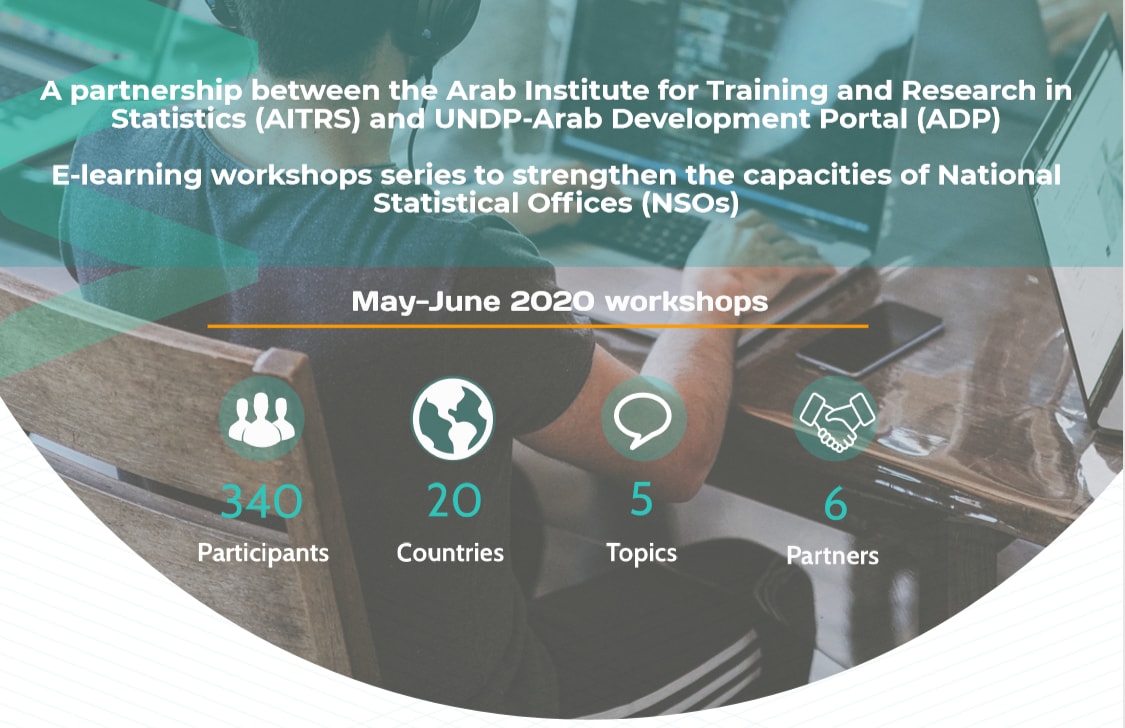Advancing statistical capacities in partnership with the Arab Institute for Training and Research in Statistics
Yasmine Koujou, Research Officer and National Statistical Offices’ Coordinator
As part of its mandate to strengthen the capacities of National Statistical Offices (NSOs) in data sharing, management, analysis, reporting, visualization and dissemination, the Arab Development Portal, and in partnership with the Arab Institute for Training and Research in Statistics (AITRS), organized five e-learning courses as part of a series titled “Tools for Knowledge and Learning to Understand and Assess the Impact of COVID-19 on the Arab Region”.
The objective of the e-learning series is to facilitate the access of mid-level civil servants at NSOs to the latest information surrounding the statistical agenda of the SDGs and the relevant reporting mechanisms. In parallel, and within the mandate to advance the dissemination of official statistics by empowering NSOs to produce more digestible and user-friendly statistical information, the series also offered a series of data visualization techniques.
These workshops were organized amid a global health crisis, which brought data to the center of attention of decision-makers and the general public. Both private and official data producers have been reporting statistics related to the numbers of infected persons, death and recovery rates but also investing in new techniques to assess the impact of this unprecedented pandemic. It is in times of crises where transparent and timely disaggregated data become more vital to support governments, development agencies and civil society organizations in addressing the impact on the most vulnerable people and most affected sectors.
Over May-June 2020, 5 e-learning courses were organized; namely: Water and Food Security, Health, Education, Governance and Data Visualization. The courses were attended by 340 participants from 20 Arab Countries[1] and in partnership with 6 international and regional institutions.[2]
During this series, representatives from NSOs shared their experiences in monitoring SDGs indicators. It was a timely opportunity for them to discuss the availability of these indicators at the national level, in addition to discussing the main challenges that they face when reporting on these indicators and the impact of Covid-19 on different sectors.
With the COVID-19 crisis emerging at a time where many countries in the region have limited statistical capacity, it is necessary to strengthen the capacity of NSOs to gather and analyze data at the national level. Transparent, accessible and timely data and well-governed data systems increase people’s trust in the state.
This series was one of the steps in this direction. Following the evaluations that was shared with the attendees, many participants expressed their satisfaction with the workshops which were organized under very challenging circumstances and emphasized the need for more focused and longer workshops on key thematic issues, relating to the SDGs. According to Sabrine Alawi, Head of the statistics Departments at the National Institute of Statistics in Tunisia “These workshops were an opportunity for participants to work closely with experts, brainstorm and share experiences, at times of lock-down in the Arab region.” The representative from Palestine, Aisar Abou Tumeh, Head of the Climate Department, noted that for him “the importance of the workshops lies in the opportunity to benefit from other Arab countries’ experience”. Also Khaled Alshatarat, Environment Expert at the Planning and Statistics Authority of Qatar praised the portal and the institute for the choice of topics which, according to him “raised participants' awareness on the COVID-19 pandemic and enhanced their knowledge on the most relevant indicators necessary to form a contextualized analysis.” In follow-up, a new series offering new topics will be launched in mid-October 2020.
[1] All Arab countries except for Comoros and Somalia.
[2] The Education workshop was held in partnership with the United Nations Educational, Scientific and Cultural Organization (UNESCO) and the Arab League Educational, Cultural and Scientific Organization (ALESCO).
The Governance workshop was held in partnership with the Office of the United Nations High Commissioner for Human Rights (OHCHR), UNDP Oslo Governance Centre, the Global Alliance for Reporting Progress on SDG16 and the Praia Group on Governance Statistics.
